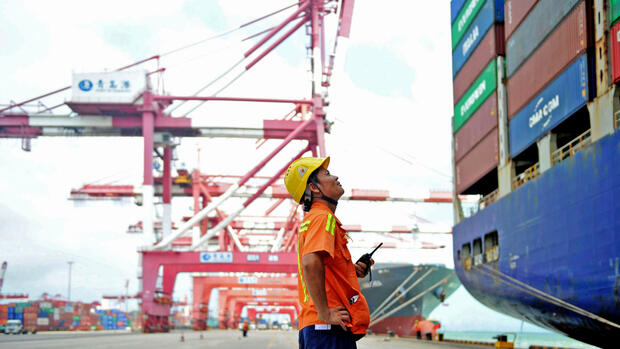Berlin, Beijing The end of the strict zero-Covid policy in China in December 2022 was celebrated not only by the local population. German export companies also hoped for better business. China became a great beacon of hope for the important German export economy, which has been in a tense situation for three years now due to the corona pandemic and the war in Ukraine.
But nothing has come of it so far. Rather, trade with China continued to collapse in the first months of 2023. According to data from the Federal Statistical Office, exports from Germany to the People’s Republic between January and April were 32.5 billion euros – ten percent lower than in the same period last year. Also compared to the last four months in 2022 there is a decrease of 5.4 percent.
The weak development is fueling concerns that the German economy will not move anywhere in the coming months. Klaus-Jürgen Gern, head of global economic forecasting at the Kiel Institute for the World Economy (IfW), says: “Exports to China have been very weak in recent months and export development has slowed down noticeably overall.”
In the winter months, the German economy had already slipped into a technical recession. Economic output had shrunk for two quarters in a row. This was primarily triggered by weak demand from private households as a result of high inflation.
Industry offset this somewhat and averted a deeper recession. With the continuing decline in inflation, slight growth has recently started to appear again.
The result: Germany is threatened with shrinkage in 2023
But that is now becoming increasingly unlikely, also because of China. The lack of demand from the People’s Republic also threatens to pull the manufacturing industry into the downward spiral. One indication is the incoming orders in industry, an important leading indicator. Orders from outside the euro zone – which primarily affects China and the USA – fell by 1.1 percent in May.
>> Read here: Why Germany is in recession – four reasons
Most economic researchers recently forecast mini-growth for 2023 as a whole for Germany. The IfW, for example, was up 0.5 percent. Given the latest developments, including with regard to the export economy, this will hardly be tenable. Economists like to say that a downward revision is to be expected. The industrialized countries organization OECD published its new projection on Wednesday: Stagnation is expected for Germany in 2023.
The hope: New export figures show improvement
But that’s not a done deal yet. There is hope that exports to China will still drive growth. On Wednesday, the Chinese customs authorities published data for imports from Germany in May. On a dollar basis, imports rose almost 7 percent from the previous month.
According to the Federal Statistical Office, exports to China had already recovered by 10.1 percent in April compared to the previous month. The information provided by the Wiesbaden statisticians is not directly comparable with that of the Chinese authorities due to the different calculation methods. However, both developments show that the chances of an improvement in the situation for the German export economy are increasing.
“The latest foreign trade figures from Germany indicate that the catch-up effect is now starting in the second quarter,” says Geraldine Dany-Knedlik, head of economic activity at the German Institute for Economic Research (DIW). Many of the exports that failed due to the zero-Covid policy could now be made up for.
Even if this happens, it is unclear whether the late recovery can actually protect the German economy from negative growth in 2023 as a whole.
The reasons: Internal and external weaknesses
Because the situation in the Chinese economy remains unstable, the weak export demand on the part of German business partners will not disappear overnight. Some of the reasons for the weakness remain:
First: China is only slowly recovering from the corona pandemic. After the end of the zero-Covid policy, high numbers of infections initially weighed on economic activity. This is largely over, but the Chinese economy continues to develop weaker than expected.
>> Read here: China’s exports collapse in May
Secondly: the ongoing real estate crisis in the country. The sector has been a key growth engine over the past two decades but is likely to see little momentum for the foreseeable future despite government stabilization measures. “Property developers are heavily indebted and investments are dampened as a result,” says DIW economist Pia Hüttl.
Third: Perhaps the hopes of the German export industry were exaggerated. According to IfW researcher Gern, the end of the Chinese zero-Covid policy is not an economic stimulus that has the same effect in all areas.
He explains: “During the Corona period, more goods were ordered worldwide – from electronic products to health materials – while consumption of contact-intensive services in particular was restricted.” Services is therefore increasing – less that of industrial goods from Germany.
The trend: China is alienating itself from German exports
Fourth: The subdued demand for German export goods is also a result of the strategy of the Chinese government. Beijing is increasingly encouraging companies operating in China to source from local suppliers.
As a result, even if German exports to China recover in the next few months, this trade relationship is likely to cool off in the long term. “German exports to China are increasingly easily replaced by Chinese production,” says Alicia Garcia Herrero, chief economist for the Asia-Pacific region at French investment bank Natixis.
An example is car parts. “What is happening now is what we should have expected given the industrial policies that China is pursuing,” Garcia Herrero said. As early as 2015, China adopted the “Made in China 2025” strategy. According to this, key sectors will be supported with billions of government dollars in order to make themselves more independent from other countries.
Garcia Herrero thinks the automotive sector is just the beginning: “There will be many more sectors where China will impose its own production.”
More: Economic experts speak out against industrial electricity prices.
